Jesus does not look like God; God looks like Jesus.
Let me explain what I mean.
For far too long, Christian theology has allowed a domineering monarchial view of God to discolor and distort our perspective of Jesus. We have an idea of God as the Sovereign King of the universe sitting on His throne in heaven, ruling the poor masses below through sheer power and control. And we have often interpreted Jesus in light of that picture of God. God, up there on His throne, is angry at us for how we rebelled against Him, and so Jesus has come to appease the wrath of God against humanity, which He does by dying on the cross.
Of course, Jesus has a dark side too, and at the end of time, when Jesus comes again, the bloody side of God will be on display in all its glory when Jesus lays waste to the world. So apparently, God is still angry at us, and although the death of Jesus calmed God down for a while, eventually even Jesus gets sick of all the sin, and decides God was right after all.
So you see? We have understood Jesus in light of God.
Thankfully, in recent decades, many pastors, theologians, and authors have begun to challenge this idea of Jesus (and God). Their idea is not new, but is as old as the church itself, and has always been the dominant view of Eastern Christianity. The view is that humanity has been mostly wrong about what God is like, so Jesus came to reveal God to us. Jesus does not look like God; God looks like Jesus.
As we in the West have rediscovered this truth once again, many people are publishing books about it. In recent years I have read dozens of excellent books on the topic. Books by people like C. S. Lewis, N. T. Wright, Walter Wink, Derek Flood, Greg Boyd, and numerous others, have been helpful guides in helping me see that God is Christlike.
A More Christlike God by Brad Jersak
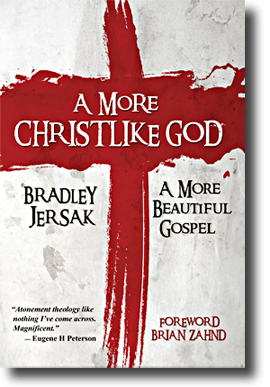 One of the most recent books I have read on this subject is the new book by Bradley Jersak, A More Christlike God. I love the title, because it makes one realize that many theologies portray a God who is not very Christlike at all. He looks more like Zeus or The Terminator. But in A More Christlike God, Brad Jersak helps us see that God looks like Jesus.
One of the most recent books I have read on this subject is the new book by Bradley Jersak, A More Christlike God. I love the title, because it makes one realize that many theologies portray a God who is not very Christlike at all. He looks more like Zeus or The Terminator. But in A More Christlike God, Brad Jersak helps us see that God looks like Jesus.
Jersak begins his book with several chapters which show how the un-Christlike view of God developed and is taught in Western Christianity. Then, beginning with the concept of self-emptying of God (kenosis) in Philippians 2, he shows how the New Testament paints a portrait of a God who is non-violent, fully loving, self-sacrificial, and completely forgiving.
Jersak’s defense of a Christlike God centers around something he calls “Divine Consent.” The idea is that just as Jesus emptied Himself of His power and position so that He might better love and serve humanity (Philippians 2), so also, God has been emptying Himself of His power and position since creation so that He also might love and serve humanity. One of the ways God did this is by giving humans a degree of genuine freedom. This means, of course, that we might use this freedom in ways God does not want. God could, of course, use His power to stop us from using our freedom in ways He does not want, but then our freedom would not be free. So God empties Himself of His power, and His right to control us, and consents to our misuse of His gift of freedom.
Yet because God knows that our misuse of His gift of freedom results in death and destruction, God doesn’t just say, “You’re going to regret that decision.” Instead, He jumps into the catastrophic consequences of our bad decisions, and works with us to bring hope, healing, restoration, and redemption from the pain and suffering caused by sin. Brad Jersak calls this “Divine Participation.”
 One of the key sections of A More Christlike God is where Brad Jersak discusses the all-important issue of “the wrath of God.” This idea is found in numerous places in the Bible, and is one of the key issues in this debate about what God is like. Many people assume that the phrase “the wrath of God” indicates that God is angry at us. Jersak presents a compelling case for why this is not a proper understanding of that term. He rightly critiques the idea that “the wrath of God” is God withdrawing His mercy. God never withdraws His mercy. God’s mercy is unfailing and everlasting. His mercy endures forever (Psalm 136).
One of the key sections of A More Christlike God is where Brad Jersak discusses the all-important issue of “the wrath of God.” This idea is found in numerous places in the Bible, and is one of the key issues in this debate about what God is like. Many people assume that the phrase “the wrath of God” indicates that God is angry at us. Jersak presents a compelling case for why this is not a proper understanding of that term. He rightly critiques the idea that “the wrath of God” is God withdrawing His mercy. God never withdraws His mercy. God’s mercy is unfailing and everlasting. His mercy endures forever (Psalm 136).
Instead, Jersak defines the wrath of God as “God giving us over” the destructive consequences of our own decisions. As we all know, decisions have consequences. While God seeks to protect us from the consequences of sin through Scripture, wise counsel of friends, and the indwelling Holy Spirit, if we continue down the path of sin and reject His many gifts of mercy, there comes a point where God’s divine consent to our willful rebellion requires Him to let us face the consequences of our decisions.
The book closed with an interesting way of explaining to others the two primary ways of understanding God in the Bible and what Jesus accomplished on the cross. To show this visually, Brad Jersak and Brian Zahnd put together a YouTube video called “The Gospel in Chairs.” Here it is:
Since this video contains the sort of perspective found in this book, I highly recommend you read A More Christlike God.
My only real complaint is that A More Christlike God does very little to help the reader understand the violent texts in the Old Testament. He makes a minor statement on page 17 (through the words of a teenager girl named Jess) that the violence in the Old Testament is not what God did, but only describes what the people thought He was doing. I would have really like a fuller explanation of this idea, especially in how this idea relates to inspiration and inerrancy of Scripture.


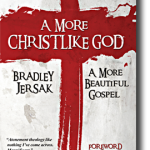

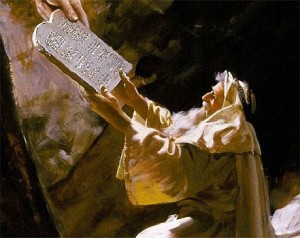 Of course, such divisions over the role of the Mosaic Law in the life of the Christian are not new. This was actually one of the first and primary theological issues to create division within the early church. From the very beginning, there were questions about whether or not Gentile Christians had to obey the Mosaic Law (Answer: No. See Acts 15). As Paul went about teaching the Gospel, he constantly faced opposition from a set of Christians who believed that to truly follow Jesus, you had also obey the Mosaic Law. Even the Apostle Peter seemed to side with this group for a while (see Galatians 2).
Of course, such divisions over the role of the Mosaic Law in the life of the Christian are not new. This was actually one of the first and primary theological issues to create division within the early church. From the very beginning, there were questions about whether or not Gentile Christians had to obey the Mosaic Law (Answer: No. See Acts 15). As Paul went about teaching the Gospel, he constantly faced opposition from a set of Christians who believed that to truly follow Jesus, you had also obey the Mosaic Law. Even the Apostle Peter seemed to side with this group for a while (see Galatians 2). But even when we think about more mundane laws, like the tax code, or campaign finance law, or even the laws about the speed you can drive or the legal drinking age, all of these laws have stories behind how they became laws.
But even when we think about more mundane laws, like the tax code, or campaign finance law, or even the laws about the speed you can drive or the legal drinking age, all of these laws have stories behind how they became laws.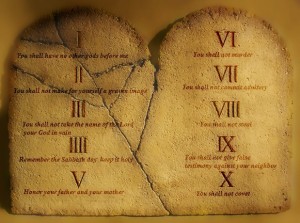 Of course, when laws are created as a substitute for love, people think that what is important is obedience to the law, rather than learning to love. And then they look for loopholes in the law which allows them to live selfishly and dangerously (not in love) while still obeying the letter of the law. When this happens, more laws are created to top this selfish and dangerous behavior. And pretty soon, 10 laws become 600 laws which become 6000 laws, which become 60,000 pages of laws.
Of course, when laws are created as a substitute for love, people think that what is important is obedience to the law, rather than learning to love. And then they look for loopholes in the law which allows them to live selfishly and dangerously (not in love) while still obeying the letter of the law. When this happens, more laws are created to top this selfish and dangerous behavior. And pretty soon, 10 laws become 600 laws which become 6000 laws, which become 60,000 pages of laws. This pattern of separation from God which leads to further religion continues throughout the Pentateuch. After the Israelites reject the relationship from God, they are given the 10 commandments. But then they create the golden calf and worship it instead of God, and so they are given more laws with greater degrees of intricacy and duty (Exodus 32ff). Later, however, they are found guilty of making sacrifices to demonic idols (Lev 17:7ff), and so God adds further laws and regulations about the sacrificial system. In the Pentateuch, the 10 laws eventually get amplified into over 600.
This pattern of separation from God which leads to further religion continues throughout the Pentateuch. After the Israelites reject the relationship from God, they are given the 10 commandments. But then they create the golden calf and worship it instead of God, and so they are given more laws with greater degrees of intricacy and duty (Exodus 32ff). Later, however, they are found guilty of making sacrifices to demonic idols (Lev 17:7ff), and so God adds further laws and regulations about the sacrificial system. In the Pentateuch, the 10 laws eventually get amplified into over 600.


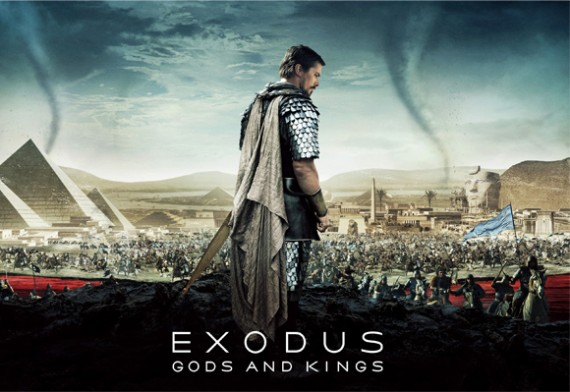

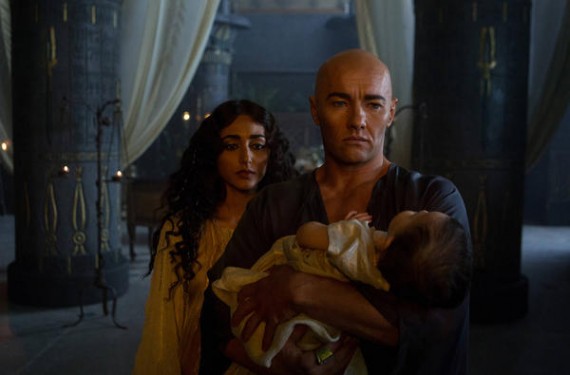


 But in the face of this grotesque depiction of a manmade-God, God has been trying to show us since the very beginning in Genesis 1, that He is a God of light, love, hope, healing, mercy, grace, and forgiveness. As a result of God’s eternal love, He created human beings so that we might love Him in return. He wants our love, but knowing that He cannot force love, He woos us and invites us and calls us to Him, but we, being the worst of all possible lovers, slander His name, drag Him through the mud, tie Him up in a dark corner, and eventually even crucify Him on a barren hill. And all the while we declare that it is God Himself telling us to do these things.
But in the face of this grotesque depiction of a manmade-God, God has been trying to show us since the very beginning in Genesis 1, that He is a God of light, love, hope, healing, mercy, grace, and forgiveness. As a result of God’s eternal love, He created human beings so that we might love Him in return. He wants our love, but knowing that He cannot force love, He woos us and invites us and calls us to Him, but we, being the worst of all possible lovers, slander His name, drag Him through the mud, tie Him up in a dark corner, and eventually even crucify Him on a barren hill. And all the while we declare that it is God Himself telling us to do these things.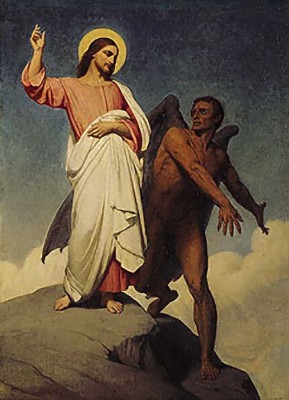 If the Christ is the Suffering King who bleeds and dies for His enemies, who loves and accepts all, and who has no desire to control others but only to serve them, then any “Christ” which is used to defend war and violence toward enemies, to reject and divide from others, and to control and manipulate others for personal gain, is the anti-Christ.
If the Christ is the Suffering King who bleeds and dies for His enemies, who loves and accepts all, and who has no desire to control others but only to serve them, then any “Christ” which is used to defend war and violence toward enemies, to reject and divide from others, and to control and manipulate others for personal gain, is the anti-Christ. 